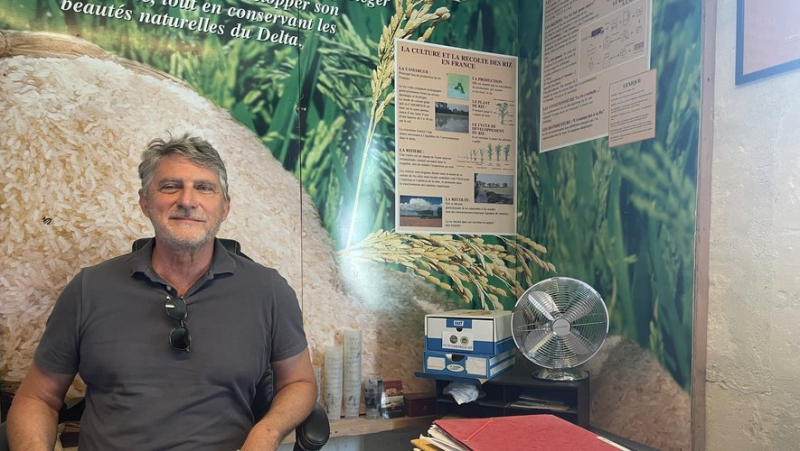For Bertrand Mazel, president of the rice growers' union: “Grassing costs us up to 50% of the harvest”

Bernard Mazel tire la sonnette d’alarme pour sauver la Camargue. Midi Libre – Alissandre Allemand
With his outspoken words and a tenacious desire to make things happen, Bertrand Mazel is the president of the Camargue rice farmers' union. Three weeks before the harvest, the farmer is sounding the alarm.
How is the 2024 Camargue rice harvest shaping up ?
I prefer to remain cautious. This year is very unusual and I prefer not to get ahead of myself. For the first time in the history of rice in the Camargue, we had to sow twice. Because of the climate, we were not able to plant everything in one month as is traditional. And the sowing lasted from April 15 to June 15. So we are going to have a shift in the harvests. And we must not allow night temperatures to drop below 12 degrees or for a strong wind to start blowing, because that could have terrible consequences on fertilization and therefore on the harvest. This is added to the weed problems and the situation becomes very complex. Every year many rice farmers prefer to drop this crop to focus on another.
That is to say, they decide to grow something else.?
Yes. Many people already have a double crop on their land in order to allow for soil rotation. But by dint of seeing their efforts reduced due to a lack of products to control weeds, they prefer to turn away from rice cultivation. And the consequences will be that the Camargue will eventually have a new topography.
What do you mean by lack of products ?
We are at a technical impasse and the yields are insufficient. In concrete terms, today we have three times fewer weed control solutions than our direct European competitors, Italy and Spain. Especially since, at the same time, we are seeing on our land that the weeds we want to eliminate have adapted to the treatment we use. The latter is becoming less and less effective and the reality is that we can now lose up to 50% of the harvest. We were supposed to meet with the ministers and in view of current events, it has fallen through. However, it is not over yet. It is essential to find a solution.
Added to this are the problems of salinization…
Yes, it is a huge problem for the future of our territory. The Camargue is a totally artificial territory because it was created by man. The Camargue rice production is 80,000 tonnes per year and extends over 13,000 hectares. And it prevents excessive salinization of the soil, which is the enemy of all life, thanks to the large volumes of water that this crop brings to the Rhone delta. Without rice growing, the fauna and flora of the Camargue would be much less rich. The future of the Camargue is linked to rice growing. However, today we are witnessing a significant deterioration of the dikes (which were built by Napoleon III following the floods in 1857, and which protect the land from sea inlets. Over the years, erosion and storms have weakened it more and more, Editor's note).
And the water is now entering the land?
Indeed, at least in two places. The Camargue is located approximately 1 meter below sea level. The latter rises by 3% per year. The fact that sea water is entering is also worrying for crops because of salinization. The situation is very alarming. Because if we do nothing, very quickly the sea will make rice crops disappear, but also salt. Essential crops which, in addition to being fundamental to food, are used in many other areas. It is not for nothing that Soprema invested 35 million euros by setting up in Saint-Gilles. They want to use rice straw to make insulating panels. If the dikes are not repaired and maintained, the Camargue will disappear. But the authorities have been passing the buck for years, explaining that this work does not fall within their remit. However, it still seems to me that the State must ensure the safety of property and individuals.
This subject even divides within the Camargue
Yes. The environmentalists clearly tell us that livestock farming and crops should just go elsewhere. That the Camargue is alive and is reclaiming its rights. Yes, the Camargue is alive. But it was man who created it. (These are 150,000 hectares of former marshes transformed by man. With the help of pumps, drainage channels and sanitation, the Camargue people were able to develop crops and livestock and feel safe for a century and a half, Editor's note). In the years to come, if this discourse prevails and the dikes are not repaired and maintained, all human activities linked to the Camargue, particularly agrotourism, risk disappearing. It is time for political inaction to stop and for choices to be made to save the Camargue.
I subscribe to read the rest




